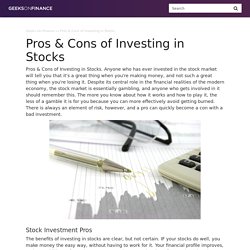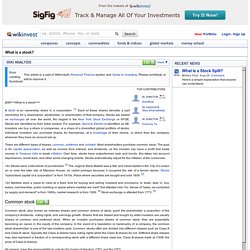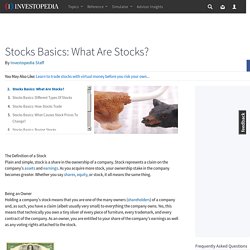

Pros and Cons To Investing In The Stock Market Today. The following is a guest post by Karl from WiseStockBuyer.com, a blog that teaches you how to how to buy stocks and grow your nest egg.

Let’s start with the positives Great Opportunities As you will undoubtedly be aware, the markets have been very volatile lately. There are two ways to look at this, you can be fearful or you can take advantage of the opportunities that arise. Personally, I love volatility, when the market is in “panic mode”, it moves on peoples emotions rather than logical economic fundamentals. Earn Income From Dividends There are many relatively low-risk stocks at present that offer fantastic dividends yields, many well in excess of 3%. Lots of FREE Help and Advice If you are new to trading stocks, there is a lot of free useful advice available online such as blogs like WiseStockBuyer.
History Shows Stocks Beat Cash If we look back through history, the stock market has shown it always beats cash in the long term and more importantly it always beats inflation. Eurozone Issues. Geeks On Finance: Pros & Cons of Investing in Stocks. Pros & Cons of Investing in Stocks.

Anyone who has ever invested in the stock market will tell you that it's a great thing when you're making money, and not such a great thing when you're losing it. Despite its central role in the financial realities of the modern economy, the stock market is essentially gambling, and anyone who gets involved in it should remember this. The more you know about how it works and how to play it, the less of a gamble it is for you because you can more effectively avoid getting burned. There is always an element of risk, however, and a pro can quickly become a con with a bad investment. Stock Investment Pros The benefits of investing in stocks are clear, but not certain. References. American Funds: Pros and cons of stocks and bonds. What is a stock? ]ASF==What is a stock?

== A stock is an ownership share in a corporation. [1] Each of these shares denotes a part ownership for a shareowner, stockholder, or shareholder, of that company. Stocks are traded on exchanges all over the world, the largest is the New York Stock Exchange or NYSE. Stocks are identified by their ticker symbol. For example, General Electric is identified as GE. There are different types of shares, common, preferred and unlisted. 14c Stocks were instruments of punishment. [2] The original Stock Market was a fish and meat market in the City of London on or near the later site of Mansion House, so called perhaps because it occupied the site of a former stocks. 12c Markets were a place to meet at a fixed time for buying and selling livestock and provisions, to trade, deal in, buy, wares, merchandise, public building or space where markets are held" first attested mid-13c.
Common stock Preferred stock Preferred stock can either be cumulative or noncumulative. References. Stocks Basics: What Are Stocks? The Definition of a Stock Plain and simple, stock is a share in the ownership of a company.

Stock represents a claim on the company's assets and earnings. As you acquire more stock, your ownership stake in the company becomes greater. Whether you say shares, equity, or stock, it all means the same thing. Being an Owner Holding a company's stock means that you are one of the many owners (shareholders) of a company and, as such, you have a claim (albeit usually very small) to everything the company owns. Yes, this means that technically you own a tiny sliver of every piece of furniture, every trademark, and every contract of the company.
A stock is represented by a stock certificate. Being a shareholder of a public company does not mean you have a say in the day-to-day running of the business. The management of the company is supposed to increase the value of the firm for shareholders. For ordinary shareholders, not being able to manage the company isn't such a big deal.